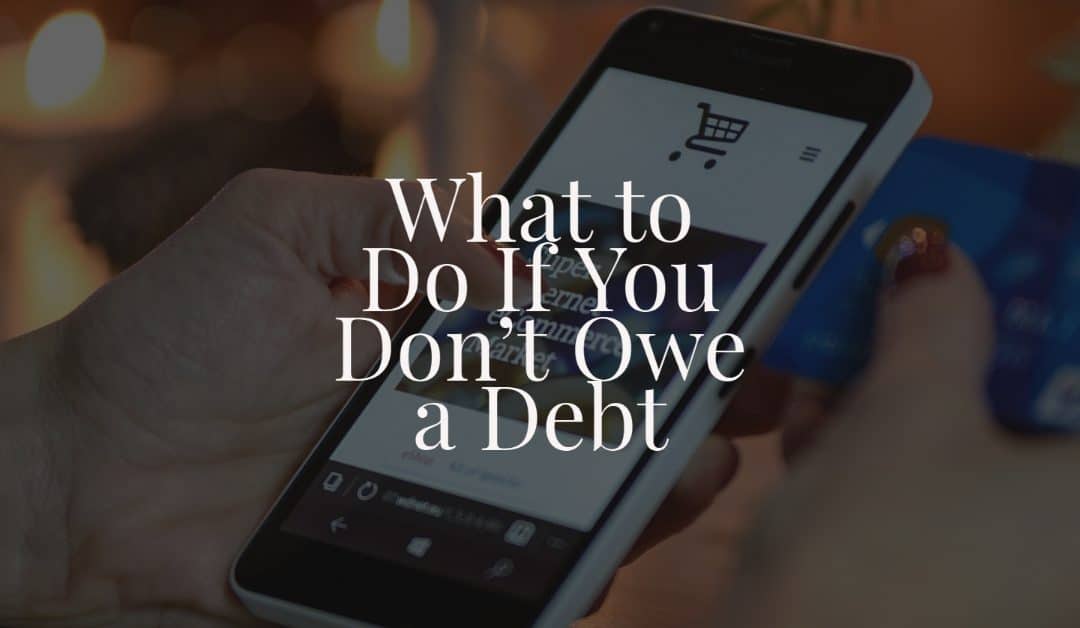Finding out you owe money to a Creditor is not exciting news. Finding out you owe money that you didn’t spend is even worse.
Perhaps a debt collection agency called you demanding payment or you pulled up your annual free credit report and saw that you have a mark against your credit for an unpaid bill from 9 months ago.
No matter how you found out about the debt, it is not welcome news.
The Consumer Finance Protection Bureau reports that out of the consumer complaints filed in 2013,
-
65% reported the debt wasn’t theirs.
-
27% reported the debt was already paid off.
-
5% reported the debt was a result of identity theft.
-
4% reported the debt was discharged in bankruptcy.
Mistakes & Errors
Mistakes often happen in billing departments and with different types of insurance that may pay some healthcare or car accident type bills.
Even a home warranty company may refuse to pay charges for a repair and you end up receiving a bill you don’t recognize months later.
If you have recently moved and did not forward your mail or your address has changed, the creditor could have lost your address in the shuffle.
Whether you owe the money or not, always call the creditor and find out what the charges are for and dispute them if they are not yours.
Debt Collection Agencies
When a debt has not been paid for a long period of time, the original creditor may sell the debt to an agency that is hired to collect the debt from you. The original company (the creditor) gets paid when the debt collection agency gets paid.
As an example, if you had a hospital bill that you did not pay 2 years ago and they quit contacting you, they may have sold your debt to a debt collection agency. Now you have someone calling you from L&M Debt Collection Agency.
Because the company asking for money has a different name, you did not recognize the debt as yours. If you realize that you do owe the debt, paying it in a timely manner will discharge your debt from your credit reports sooner and keep your credit rating from taking a hard hit.
Steps to Take
If you are not sure if you owe the debt, ask these questions:
-
Name of debt collecting agency, their address, and phone number
-
The amount of the debt, including interest or collection costs
-
What was the debt for?
-
When the debt was incurred?
-
Who was the original creditor?
-
Is there anyone else who may owe this debt?
If you don’t know who the original creditor is, ask. If the answer is not clear, send the debt collection agency a letter. Click here for sample letters stating that you do not owe the debt, or asking for more information about the debt.
Dispute the Debt with a Debt Collection Agency
If the original debt is not yours, you must make a dispute in writing. Usually, you must dispute within 30 days or the debt collector will assume the debt is valid. If you dispute the debt, the debt collection agency must provide verification of the debt owed.
Because of laws describing how and when debt collection agencies can contact you, you have consumer rights that include the right to dispute the debt.
You can also write letters asking the debt collector to stop contacting you or to only contact you through your lawyer. By law, they must accept your demands to cease contact.
Keep Extensive Records
Always keep extensive records on what happens and when it happens when dealing with a debt collection agency. Keep all of your emails in a folder. Record the time and length of any phone calls.
Many debt collection agencies have been caught breaking laws and harassing consumers about debt they do not owe. This is unlawful and can result in a lost case for them if they decide to sue you for the debt owed.
According to the CFPB, one of the largest cases won by the Federal Trade Commission resulted in a settlement that now requires that whenever a consumer disputes the validity or the amount of a debt, the company must either terminate collection efforts or suspend collection until it conducts a reasonable investigation and verifies that its information about the debt is accurate and complete.
Before the decision, this particular company had been engaging in harassing collection calls, disclosing consumers’ debts to third parties, and continuing collection efforts without verifying debts even after consumers said they did not owe those debts.
Is the Debt Collection Agency in Violation of the Law?
If you are being harassed by collection calls after asking them to cease contact or by a collection company telling your personal details to your employer or other family members, or if they are continuing to try to collect debt that you have informed them in writing that you do not owe, the collection agency is in violation of the law.
Contact an Attorney
If the debt collection agency decides to sue you, contact an experienced consumer rights attorney who can defend you according to the law. There are many laws that protect you from harassment by these debt collection agencies. They must provide proof that you owe the debt but they must also have abided by the law while trying to collect the debt from you.

